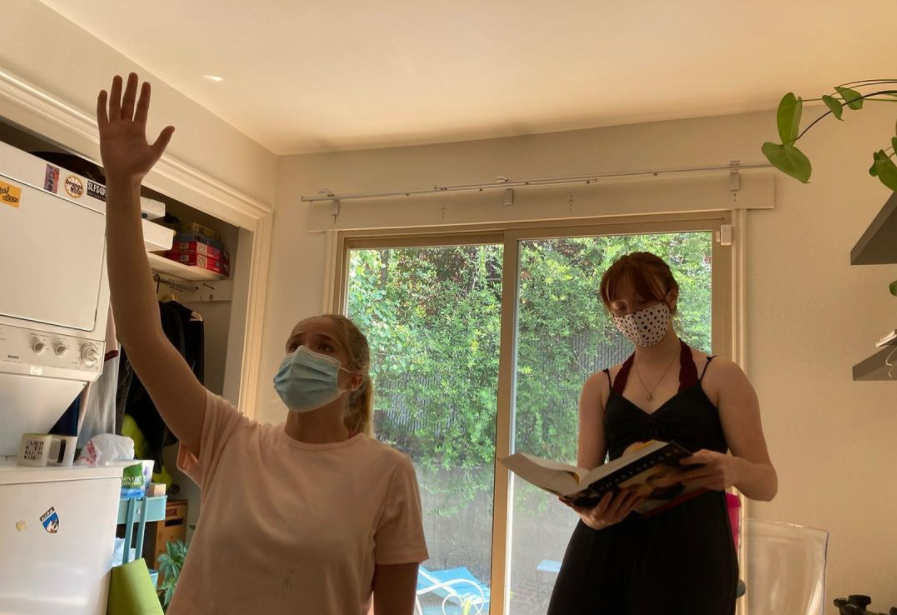Fringe Fest: Despite Festival Cancelation ‘The Well Spoken’ is Powerful
Lexie Thomsen and Allison Billmeyer in rehearsals for “The Well Spoken.” (Courtesy Bonneville Theatre Company Instagram)
August 9, 2021
Many theatre companies have experienced transition over the past year and a half, not only in the losses felt during the COVID-19 pandemic, but in addressing concerns of diversity and inclusion in their productions. In “The Well Spoken,” a new show featured as a part of the Great Salt Lake Fringe Festival, audiences were privy to the behind-the-scenes conversations between company co-founders planning a new season.
Though the remainder of its run at the Fringe has been canceled due to COVID-19 concerns, “The Well Spoken” was a two-person, short play about a theatre company’s social media announcement of their production of Shakespeare’s “Richard III,” and the backlash and “cancelation” they receive for insensitivity, despite their best attempts. Playwrights Aiden Croft and Melissa Salguero navigate the complexities of performative inclusivity and language with tact and humor in their text, delivered by actors Allison Billmeyer and Lexie Thomson.
A Company Being Canceled
Billmeyer, a graduate of the University of Utah’s Actor Training Program, and Thomsen, a current student in the program, play Robert Johnson and Angie Woolsen, co-artistic directors and founders of Bonneville Theatre Company — a fictional version in the world of the play.
The two discuss, debate, flatter and fluster their way through a conversation about the digital hate they receive due to a less-than-thoughtful casting and show choice. Watching Billmeyer embody Robert — an older, white man passionate about his yoga and his Shakespeare — was an acting treat, and the story was changed with her and Thomsen playing these characters.
The show is centered around including all aspects of intersectionality on stage, including race and gender, as Robert and Angie argue over the burden of their own privileges, but the story pays special attention to disability. With Robert sitting in this leadership role as a straight, white, cisgender male and Angie casting herself to play the described “deformed” Richard, the playwrights go as far to show the audience that these characters haven’t done enough, wrapped up in their own fear of being “canceled” and their careers ended.
Characters In Conversation
For as short and quippy as the show is, it was a treat to watch. The conversations held between the characters were honest and hilarious to the point of cringing — the characters attempt to acknowledge their privileges and “holding space,” but still identify with victimhood, guilt and a sense of having paid their dues. It’s flawed logic, but the play is all the more funny for it.
As a theatre enthusiast and director myself, the most engaging piece of the show, in my opinion, was the show’s end. In a scene staged like an after-credits sneak peek, the show’s director stood up from the audience and gave notes to Thomsen and Billmeyer, continuing the dialogue of the show through slightly snooty stage buzzwords. “Remember, they aren’t caricatures, they’re characters,” she said. Again, it was the dessert of the show — a comment for theatre people by theatre people on how theatre people try to comment on theatre. All very meta.
While the Great Salt Lake Fringe Festival was canceled on Aug. 7 due to two artists testing positive for COVID-19, you can follow the (real) Bonneville Theatre Company on social media, as well as the other companies featured during the festival.








